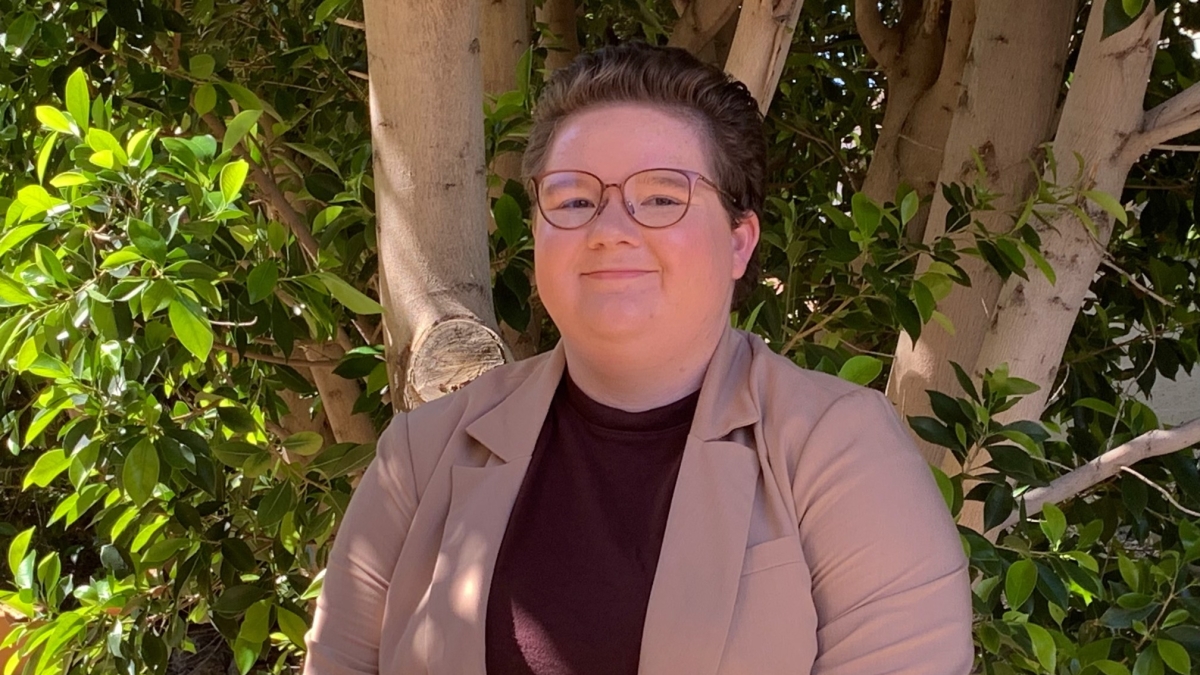Public affairs grad finds fulfillment in using policy to help people

Rory Wilson, spring 2024 Watts College Outstanding Graduate, School of Public Affairs. Courtesy photo
Editor’s note: This story is part of a series of profiles of notable spring 2024 graduates.
At first, Rory Wilson thought she wanted a career in forensic science, a field she said she wanted to work in since she was in high school.
But the Fountain Hills, Arizona, resident said her interest in police reform coupled with her desire to have an impact in solving community challenges such as homelessness led her to transfer to ASU to study public policy.
“In the summer of 2020, I collaborated with friends to organize a peaceful demonstration in support of our Black community members amid increased awareness of police brutality and calls for reform,” said Wilson, the spring 2024 Outstanding Graduate from the School of Public Affairs, part of the Watts College of Public Service and Community Solutions.
“I served as the primary liaison between my group and local officials to ensure we had a successful and safe event.”
A few months later, the town of Fountain Hills named Wilson to its Community Services Advisory Commission (CSAC), after an official she had worked with during the summer encouraged her to apply.
“The CSAC is where I discovered my curiosity about how local government operates and how officials engage with constituents to address the diverse and interconnected challenges that communities everywhere experience,” she said.
Not long afterward, Wilson made the switch from Grand Canyon University to ASU and a degree program in public policy. Wilson earned two Bachelor of Science degrees: one in public service and public policy from the School of Public Affairs, the other in sociology from The College of Liberal Arts and Sciences.
“Science is one thing, but being inside working with people and in the community constantly, it would mean so much. Having those one-on-one conversations is better than the other career,” she said.
“Also, I just love the idea of policy.”
Wilson said her internship with A New Leaf, a Mesa, Arizona-based behavioral health services center, led her to want to apply her policy background to work in the nonprofit sector tackling affordable housing and other issues.
“Some people are only one or two paychecks from being homeless. As a young person, housing costs are nearly impossible,” she said. “I live at home with my parents. Some of my friends live three or four to an apartment. Some people lack education for a better job, are LGBTQ+ or have medical or mental health issues. We should give them housing first.”
Read on to learn more about Wilson’s ASU journey.
Note: Answers have been edited for length and clarity.
Question: What’s something you learned while at ASU — in the classroom or otherwise — that surprised you, that changed your perspective?
Answer: The most significant thing I’ve learned is the value of finding key people who can serve as your “accountability/affirmation” partners. In other positions and times in life, I don’t think I have ever realized the fundamental need to make lasting connections with individuals whom you can trust and express vulnerability with, learn from and also mentor in return than I have at ASU. As a lifelong introvert, finding people I can trust and be vulnerable with about my future goals has always come as a challenge to me. But now, in what seems to be everywhere I go, there is always someone who can support me.
Q: Which professor(s) taught you the most important lesson while at ASU?
A: Working with Associate Clinical Professor Kelly Ramella as an undergraduate research assistant has been eye-opening in many ways. The research project I contributed to involved learning how to code using MAXQDA and the benefits and challenges of qualitative analysis.
Having the opportunity to work with Professor Ramella has been incredibly impactful, not just academically, but professionally and personally. She’s encouraged and motivated me, having started as an anxious introvert when we first met, to presenting our findings at the World Social Science Association's 2023 Conference. She’s become both a mentor and a friend, someone who I can bounce ideas off that are both directly and indirectly related to school and our research, ranging from internships to projects I work on within my own community.
... Some other notable instructors that have stood out to me and to whom I am incredibly grateful for the opportunity to learn from them include Kenichi Maruyama and Cynthia Seelhammer (School of Public Affairs), and Ambassador Michael Polt and retired Army Lt. Gen. Benjamin Freakley (Leadership, Diplomacy & National Security Lab).
Q: What’s the best piece of advice you’d give to those still in school?
A: Get out of your comfort zone. People will tell you that your whole life, but during college, this has been the most important step that I’ve taken repeatedly over the years.
With that, I also cannot emphasize enough the importance of networking. Not every student has the opportunity to intern at organizations. However, students need to know that you don’t need to hold an internship to network with professionals. Volunteering, attending an event or seminar hosted by an organization you admire or cause that you’re interested in, joining a citizen advisory commission or even a nonprofit board are all great ways to become engaged in issues affecting communities, collaborate with professionals and gain even just a little bit of insight into what your impact on the world could be outside of the classroom.
Q: What are your plans after graduation?
A: I intend to continue my education at ASU and pursue my Master of Public Administration (urban management) degree as I work as Marvin Andrews Fellow. I look forward to serving communities and working with local leaders in addressing challenges such as homelessness, infrastructure and improving quality of life. By earning my MPA, I hope to further develop my skills and knowledge in effectively utilizing and revitalizing underutilized and overlooked spaces for the benefit of community members.
Q: If someone gave you $40 million to solve one problem on our planet, what would you tackle?
A: I would address the affordable housing crisis. While this problem certainly would not be solved with $40 million, it can be alleviated in some regions by developing apartment units or even tiny houses to give our most vulnerable members of society a chance to exist in a place where they can call home.
People who experience homelessness are constantly criticized by other members of society for being lazy, dirty, crazy, etc., though they’re never given the benefit of the doubt.
Our unhoused community members experience every single challenge in public. The housed population of society have the privilege of experiencing the worst of lives in private, with the gaze of strangers and their judgment absent. Not only should unhoused community members be afforded the privilege of having their bad days to themselves, but they also deserve the right to look forward to going home at the end of the day rather than not knowing where or when they might sleep next.
The right to privacy is vital, and even one of the principles our country was founded on. But having a home — an address — would open so many more opportunities for unhoused people to open bank accounts, apply for their driver’s licenses, secure stable employment and so much more, without being questioned.
More Sun Devil community

Tested tips for taking exams
With May quickly approaching, many students are starting to prep for their most important tests of the year — final exams.Toni Miceli, the inaugural director of the bar exam success program at…

School of Transborder Studies celebrates 15th anniversary
During the summer before his freshman year at Arizona State University, Salvador Macias participated in the AGUILA Youth Leadership Institute, a college access organization designed to help young…

Barrett program unlocks study abroad for first-year honors students
Twenty first-year students from Barrett, The Honors College at Arizona State University are spending their second semester studying abroad in Rome, Italy.Traveling in a tight-knit honors community…

